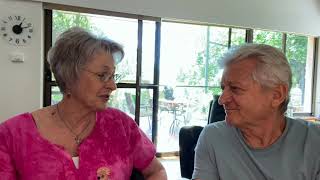“Sometimes,” said the horse. “Sometimes what?” asked the boy.
“Sometimes just getting up and carrying on is brave and magnificent.” ~Mackesy, 2019.
“Nothing is ever too far gone for hope to come find you.” ~Unknown
“Now hope does not disappoint…” ~Romans 5:5
We are sitting in our favourite place at Evans Head on a tiny, private balcony facing the sea. The summer sun warms our skin. A gentle sea breeze and the sound of lapping waves wash away the year’s weariness. It is New Year’s Day. Our WhatsApp is full of kindnesses – messages telling us of how we have blessed people in other countries during this past year. I am surprised and deeply humbled, as we have only been able to meet through electronic communications due to COVID. We sense God’s favour on our ministry.
This is a day of reflection on what gives life. There are some doors that need closing for others to open in the new year. Like a houseplant that has outgrown its container I hunger for more of God, more heart healing and mystery. As Carson McCullersaffirms, “We are homesick most for the places we have never known.” My soul will not let me remain rootbound or settle for less. Perhaps that is why I am drawn to adventure and risk because if I only lived in the same place my whole life, I would never fully learn how to affirm its merits and critique its shortcomings in the light of contrasting experiences. When I am in the minority and at the edge of my emotional and physical limits, adventure becomes my teacher. In the midst of my confusion, I hear God’s voice, “What are you doing here?” Many of the most transformative changes in my life have come about when my heightened senses are open to people from different cultures who challenge my previously unexamined values and priorities. Let me give you a couple of examples.
Harassed and Helpless
For a couple of seconds our eyes lock. His chest is pierced with metal hooks attached to ropes that are suspended from a large metal meat hook fastened to the back of a pick-up truck. There is no blood. His knowing look reflects his drug-induced trance of devotion to his Hindu god. For him, physical pain is an act of wounding in pursuit of spiritual transcendence. Victor Frankl in his book Man’s Search for Meaning observed, “You will see some hard things, and you’ll need to find ways of making meaning so that you’ll be able to cope with the way it will break your heart.” He was accurate.
I have travelled to Sri Lanka from East Africa where I taught community leaders about trauma recovery. I am meeting my husband this evening as he journeys from Australia. Imprisoned in the back of a taxi cab and unable to move through the now stationary traffic, I am transfixed on this brutal spectacle. The suffocating humidity, combined with the loud noises of chanting, shouting, drumming and dancing, leave me wondering where in the world I am.
It is 2010 and this is my introduction to Sri Lanka. In the midst of trying to make meaning from what I see, I hear God asking, “What are you doing here?” I implore Him, “Who am I to speak to these Hindu people who are so different to me? How can I connect with their hurt? With their physical and emotional scars from nearly thirty years of political and war violence? How can hope be sustained?” Eventually, the procession moves on and so do I. Yet my heart is torn and disturbed by what I have witnessed. How do I integrate this self-punishing ritual demanded of their gods with what I know of my gracious God who does not require such appeasement?
Fast forward four years and I am sitting in the dark in a row boat with my husband and tour guide on the Ganges river in Varanasi, India watching a Hindu ceremony. The smell of burning bodies on funeral pyres further down the river assaults our senses. Crowded on the Ganges gnats are thousands of people celebrating the triumph of good over evil. Women adorned in strikingly colourful saris make offerings and prayers to their gods for prosperity and wealth, primarily for their sons.
As dawn breaks we float close to shore. Many women have been standing in the water all night long, hoping their devotion matters to their gods. For a few seconds I lock eyes with some of the women. The pain, emptiness and hopelessness I see shocks me. Grief washes over me as I witness the sheer volume of throbbing humanity gathered in one place, hoping for the pleasure of the gods. I hear my God ask, “What are you doing here?” Jesus’ words come to mind, “When he saw the crowds, he had compassion on them, because they were harassed and helpless, like sheep without a shepherd” (Matthew 9:36).
What can we learn from the pattern of the Psalms?
 Photo by Alabaster Co on Unsplash
Photo by Alabaster Co on Unsplash
The question, “What am I doing here?” followed me home. Knowing the importance of coming to God to process my emotions, Iplunged into the Psalms. Therein I found a pattern or cycle that helps answer the question. One of my favourite Bible verses is Psalm 40:2, “He lifted me out of the slimy pit, out of the mud and mire; he set my feet on a rock and gave me a firm place to stand.” The Psalmist speaks of being brought up out of the ditch and the deep mud. Henri Nouwen (1979, p. 72) knew what it was like to sink into a deep and lonely place when he says, “Who can take away suffering without entering into it? The great illusion of leadership is to think that others can be led out of the desert by someone who has never been there.” Someone who has been there is King David who wrote many of the Psalms that are full of expressions of deep longing for God. Therefore, the Psalms are a good place to enter in and let God speak to us. God says in Jeremiah 29:13, “You will seek me and find me when you seek me with all your heart.”
In many of the Psalms, Walter Brueggemann (2002) believes there is a pattern that speak to us in the hard and painful places of life. Take Psalm 77 (MSG) as an example:
1-5 I yell out to my God, I yell with all my might,
I yell at the top of my lungs. He listens.
2-6 I found myself in trouble and went looking for my Lord;
my life was an open wound that wouldn’t heal.
When friends said, “Everything will turn out all right,”
I didn’t believe a word they said.
I remember God—and shake my head.
I bow my head—then wring my hands.
I’m awake all night—not a wink of sleep;
I can’t even say what’s bothering me.
I go over the days one by one,
I ponder the years gone by.
I strum my lute all through the night,
wondering how to get my life together.
7-10 Will the Lord walk off and leave us for good?
Will he never smile again?
Is his love worn threadbare?
Has his salvation promise burned out?
Has God forgotten his manners?
Has he angrily stalked off and left us?
“Just my luck,” I said. “The High God goes out of business
just the moment I need him.”
11-12 Once again I’ll go over what God has done,
lay out on the table the ancient wonders;
I’ll ponder all the things you’ve accomplished,
and give a long, loving look at your acts.
13-15 O God! Your way is holy!
No god is great like God!
You’re the God who makes things happen;
you showed everyone what you can do—
You pulled your people out of the worst kind of trouble,
rescued the children of Jacob and Joseph.
16-19 Ocean saw you in action, God,
saw you and trembled with fear;
Deep Ocean was scared to death.
Clouds belched buckets of rain,
Sky exploded with thunder,
your arrows flashing this way and that.
From Whirlwind came your thundering voice,
Lightning exposed the world,
Earth reeled and rocked.
You strode right through Ocean,
walked straight through roaring Ocean,
but nobody saw you come or go.
20 Hidden in the hands of Moses and Aaron,
You led your people like a flock of sheep.
In the cyclical pattern that appears in Psalm 77 (and many others), there appears to be a progression from illusion and disillusionment, orientation, reorientation and reality. Let’s briefly explore each one.
Illusion and disillusionment
 Photo by Eric Ward on Unsplash
Photo by Eric Ward on Unsplash
Psalm 77:7-9 exposes our illusions, the way we want life to work. When I married and children came along, I assumed that by merely trying to be the person I wanted to be, it would produce the results I desired and we would live happily ever after. Then came inevitable disillusionment in verses 2b-4, whereby I realised that what I ached for most, I could not make happen. I could not pull it off and my attempts produced a lack of authenticity. What followed for me (and I suspect most disillusioned people) was a period of time where there was no future, only futility.
Paula D’Arcy (2005), a writer and speaker, visited this place when her husband and child were killed in a car accident while she was pregnant with her second child. She used the metaphor of the family dining table or the place where she unconsciously ingested her attitudes and ideas about life and God into her personality. She tells how when tragedy struck, the table broke and her illusions were shattered. This was not the God she wanted. Tragedy happened to other people, not to her family. Her disillusionment almost crushed her.
The table is an apt metaphor for illusion that hurls us into disillusionment. Alan Jones (1989, p. 84) writes:
God is felt in places too deep for words, in depths beyond ideas and concepts. God is felt in pain and sorrow and contradiction. This, in itself, comes as a shock, since we tend to make religion only of our better moments. Our worst moments tend to be repressed and denied. When this happens, we begin to lie to ourselves; and when we lie, the fabric of life begins to fall apart.
 Photo by Daniel Tafjord on Unsplash
Photo by Daniel Tafjord on Unsplash
According to Jones, it is in the desert of Sinai that you find the mountain of God. Likewise, Paula D’Arcy, tells how, in her deep grief and despair, she was introduced to Norman Vincent Peale. She told him, “My life is over,” whereupon he looked her in the eye and with the greatest compassion responded, “The life you wanted is over.” Disillusionment had seeped into every crevice of her soul and Peale’s gentle challenge began the first stirrings of hope.
Similarly, the pain and suffering I witnessed in post-war Sri Lanka defied processing. My Western mindset had no previous experience of war that would help me integrate what I had witnessed into my life. The entire north of Sri Lanka was like an open wound that might never heal. Even though our trauma workshops were reported as helpful (some even experiencing the first stirrings of hope), my tendency to absorb other people’s emotions left me with vicarious trauma. Like the prophet Elijah following his effective ministry, I was in a disillusioned place. And like both Paula D’Arcy and Elijah God asked me, “Paula, what are you doing here?”
Like David in the Psalms God invited me to bravely face my feelings and acknowledge my internal reality and vulnerability:
43:2: You are God my stronghold.
Why have you rejected me?
Why must I go about mourning,
oppressed by the enemy?
42:5,11; 43:5: Why are you downcast, O my soul?
Why so disturbed within me?
42:9: I say to God my Rock,
“Why have you forgotten me?
Why must I go about mourning,
oppressed by the enemy?
Note the ironic accusation in above verses when the Psalmist cries:
You’re supposed to be my rock, my stronghold, the reliable, immovable entity in my life. Well, the rock moved, the stronghold has fallen, you’ve let me down, God. The enemy is mocking my testimony. You aren’t bothered about it, you haven’t done anything about it. Why
David expresses his indignation, maybe even an element of anger when he repeats again and again, “Why, God, why? Why?” This is an important question to ask, because while we are asking the hard questions, we are engaging with God.
In the novel, The Blood of the Lamb, by Peter de Vries (2005), the main character has a daughter who, on her twelfth birthday, dies of leukaemia. The father is still holding a birthday cake he was taking to hospital to try to cheer her up on her special day when he hears the news. He finds himself outside a church and as he looks up at the crucifix on the wall, he suddenly explodes with rage and hurls the cake at the face of Christ. We might well ask, “Is this wrong?” When Jesus experienced profound feelings of betrayal and pain, He cried out in His distress, “My God, my God, why have you forsaken me?” We must not be afraid to do the same, as this is why Jesus died on cross. He is a symbol of all the passionate anger of God against all sin, evil, injustice and brokenness in this sick world where depression, illness and death rob us of all He intended for us.
Orientation
 Photo by Jeremy Yap on Unsplash
Photo by Jeremy Yap on Unsplash
Nevertheless, David orientates himself by turning his face toward God and recalling God’s goodness from the past. Trust is conditioned by past experience and David begins to unclench his hands in Psalm 42:4:
These things I remember as I pour out my soul: how I used to go with the multitude, leading the procession to the house of God… By day the LORD directs his love, at night his song is with me – a prayer to the God of my life.
David remembers when he has felt close to God in 43:5, “Why are you downcast, O my soul? Why so disturbed within me? Put your hope in God, for I will yet praise him, my Savior and my God.” David is suggesting that his recollection of past blessing helps him in present. In this way, faith becomes trust that God has been faithful, He is faithful now, and He will always be faithful. Someone said that memories are given to us so that we might have roses in winter. David’s remembering encouraged him to believe that he could experience joy once again and it brought comfort in a time of spiritual drought. On a practical note, some people find that a good way to look back and remember God’s goodness to them is through the process of journaling.
Rreorientation
Then comes a turning around in verses 11 to 20. The anguish is still there, but out of devastation the Psalmist finds his way to God. In verses 10 to 20 the Psalmist lives under no illusions. God is in control and nothing in His control can ever be out of control. David says, “Soul, why are you feeling like this? Put your hope in God.” So much of our self-talk is negative. Instead, David exhorts himself, “Put your hope in God.” He attempts to step back and look at things objectively by asking, “Why are you downcast? This is illogical!” However, he is realistic when he declares, “I will yet praise Him.” He is affirming that this too will pass.
David also prays for patience. “Hope in God” could be translated “wait for God.” This is what faith is. David was firm with himself, “Put your hope in God, for I will yet praise him, my Saviour and my God.” Maybe he is saying, “Fight it. Don’t collude with your downcast spirit. Learn to conduct an inner war with yourself to resist it. Don’t let your feelings dictate your life, be in charge of them – learn to regulate them – learn to soothe yourself in the God of hope.”
Reality
 Photo by Max Kobus on Unsplash
Photo by Max Kobus on Unsplash
The final movement in the cycle is facing reality, as the Psalmist prays for deliverance. In fact, praying for deliverance is the central theme in Psalm 43:1-4:
Vindicate me, O God, and plead my cause against an ungodly nation; rescue me from deceitful and wicked men. Send forth your light and your truth, let them guide me; let them bring me to your holy mountain, to the place where you dwell. Then will I go to the altar of God, to God, my joy and my delight. I will praise you with the harp, O God, my God.
In other words, “God, get me out of this situation.” In the very act of composing this Psalm, David has actually been working through his depression. He begins with a morbid soliloquy of asking: Where are you God? God seems remote. But the Psalm ends with a dialogue. Lament gives way to petition and the light goes on for the Psalmist in 42:6 that says, “I will remember You.” When he ventilates his anger and resentment, he can move to more constructive forms of prayer; such as, the prayer of deliverance in Psalm 43:
God, you’re just; it’s my circumstances that are really the problem. I am feeling spiritually, socially and physically isolated. Deliver me then from the torture of this exile. God, you and I have a personal relationship. You are my stronghold; be true to the character I know you possess and guide me back home into the experience of your grace and presence again
David felt an intense longing to be close to God. He expresses an ache for God in Psalm 42:2, “My soul thirsts for You, God.” A downcast mood and negative emotions often isolate me from God where I fail to feel His presence. Maybe those who do not struggle with this may be disadvantaged because they never weep for lack of a felt closeness to God. They are unaware of their deep thirst. Maybe they have just enough water to keep real thirst at bay and this leads to a superficial relationship with God. They never encounter God at this profound level of personal engagement where there is no more need to wrestle with God. Desperate prayers have been relinquished.
So, maybe we should envy the Psalmist. The intensity of his life is a blessing, as it engenders in me a hungering, a thirsting and a yearning for God. David loves and longs for God and he discovers that God loves and longs for him. From a spiritual perspective, “no matter how much grace God has blessed us with, we forever remain dependent upon its continuing flow” (May, 2007, p. 90). David’s depression is not the enemy of his faith. Rather, he longs to experience the living presence of God and He does, declaring in Psalm 103:1-5:
Praise the Lord, my soul; all my inmost being, praise his holy name. Praise the Lord, my soul, and forget not all his benefits – who forgives all your sins and heals all your diseases, who redeems your life from the pit and crowns you with love and compassion, who satisfies your desires with good things so that your youth is renewed like the eagle.
Therefore, when God ask, “What are you doing here?” I turn to the Psalms to find hope.
Experiencing the Cycle – India

Like Elijah, the valley was deep following the mountaintop experience of profound joy. In India, we had witnessed people having healed hearts. They were freed from their long-standing wounds and buried secrets that were keeping them bound in their relationships and ministries. The Holy Spirit was powerfully using us in profound ways that made us breathless with wonder and joy. But “the thief comes only to steal and kill and destroy…” (John 10:10). Immediately after returning home, the enemy accused me through someone else. It triggered a deep, unhealed emotional wound. In my vulnerable state, my faith and focus were temporarily shattered and I descended into the grief of disillusionment. Exhausted, hurt, betrayed and disheartened, I sought shelter in my desert, fleeing into my inner world, isolating and disengaging from everyone around me and cutting off the support I so desperately needed.
Similar to Elijah, God found me in my wilderness and gently loved me back to life. “[Jesus] confronted despair and made it abundantly clear it wouldn’t win” (Nieuwhof, 2018, p. 25). As I opened my heart to the Holy Spirit and remembered His past grace, I allowed His life to seep into mine. His compassion guided me to find the rest, nurture and solitude I craved in order to heal. Then, when God gently asked, “Paula, what are you doing here?” I began researching and writing with an urgency to understand how I could plunge into such a deep valley after such joy. I sought to understand the depth of the trigger for my collapse. The result turned into a book. On the cusp of a new year, I look back like the Psalmist and clearly see the goodness of God in my life.
Reflect
How homesick are you for the places you have never known?
In John 10:10 Jesus says, “I have come that they may have life, and have it to the full.” Recall a time when you have felt alive in the fullness of God. Spend a few moments feeling and enjoying the aliveness in your body, soul and spirit. Tell God what it is about that time that you enjoyed.
Without judgement nor trying to fix it, invite God to show you what He wants you to see about your life now.
Where are you in the pattern of the Psalms?
Illusion
Disillusionment
Orientation
Re-orientation
Reality
Ask God to enter this place and tell you what He wants you and Him to do about it this year.
Declaration…
I declare that You, God, are good. You sent Your Son, Jesus, so that I would experience abundant life. You came to heal the broken-hearted and rescue those whose spirits are crushed. I declare that Your ears are open to my cries for help and that You will deliver me from desolation to fullness of life as I trust in You. I declare that You alone are my hope and my comfort.
Prayer…
You are the God who heals. I run to You in my desolation and I thank You that You listen when I pray. I ask You as David did, to be delivered from all my troubles and suffering. I pray for the gift of abundant life and joy, because I come to You for refuge. I have tasted and seen in the past that You are good. Remind me of Your steadfast love and grace when I lose sight of it. In Jesus name I pray, amen.
About the author: Dr. Paula Davis is a clinical counsellor, supervisor and educator specialising in psychological trauma. She has worked in higher education over many years as senior lecturer in counselling. Along with her husband she designs and delivers marriage enrichment/education programs in Australia, Africa, Sri Lanka, India and Europe.
References
Barnes’ Notes on the Bible. (n.d.). Isaiah 61:3. BibleHub. Retrieved from https://biblehub.com/commentaries/isaiah/61-3.htm
BibleHub. (n.d.). Isaiah 61:3. Retrieved from https://biblehub.com/lexicon/isaiah/61-3.htm
C. Joybell C. (n.d.). C. Joybell C. quotes. goodreads. Retrieved from https://www.goodreads.com/quotes/488135-the-strength-of-a-woman-is-not-measured-by-the
Groom, N. (2006). From bondage to bonding. USA: NavPress.
Jastrow, M. (1899). Dust, earth, and ashes as symbols of mourning among the ancient Hebrews. Journal of the American Oriental Society, 20, 133-150. Retrieved from https://www.jstor.org/stable/pdf/592320.pdf
Jones, A. (1989). Soul making: The desert way of spirituality. USA: HarperOne.
Legge, D. (2011). “Put on the garment of praise.” Preach the Word. Retrieved fromhttps://www.preachtheword.com/sermon/misc0102-garment-praise.shtml
Mackesy, C. (2019). The boy, the mole, the fox and the horse. UK: Penguin.
MacLaren’s Expositions. (n.d.). Isaiah 61:3. BibleHub. Retrieved from https://biblehub.com/commentaries/isaiah/61-3.htm
May, G. G. (2007). Addiction and grace: Love and spirituality in the healing of addictions. USA: HarperOne.
May, G. G. (2007). Addiction and grace: Love and spirituality in the healing of addictions. USA: HarperOne.
Mulcahy, S. (2018). Reflections of the heart. USA: Balboa Press.
Nepo, M. (2013). Reduced to joy. USA: Viva Editions.
Nieuwhof, G. (2018). Didn’t see it coming: Overcoming the 7 great challenges that no one expects. USA: WaterBrook.
Rohr, R. (1987). Broken and blessed [Audio Cassette]. USA: Credence.
Solle, D. (1975). Suffering. USA: Fortress Press.
Walsh, S. (2008) Let go. USA: Thomas Nelson Inc.


0 Comments